|
ANAKOJ-ELI,
MY MOTHER'S BIRTHPLACE IN CRIMEA
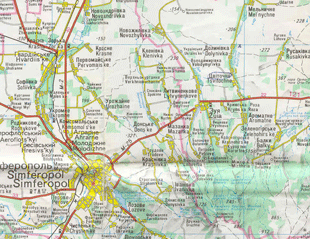
From Simferopol,
follow the highway M-25 to the north-east. Look for the
left turn-off for Tsvitochne. Go north a few more kilometers
and look for an "x" marked on the east side of the Burul'cha
River. This marks the spot where the small village of
Anakoj-Eli once existed, about 30 km from Simferopol.
Also look for the village of Aromatne, south of highway
M-25. This is the former Catholic Crimean village of Rosental.
Ulrich Mertens' list of Crimean villages gives the population
of Anakoj-Eli as 63 people in 1904, and 96 in 1926. It
was leveled to the ground in the late 1940's. On 06 Jun
2005 I stood on the edge of a large barley field where
the houses once stood, on a short, but steep rise overlooking
the Burul'cha River. The name of Anakoj-Eli is referenced
from my mother's
Russian birth certificate.
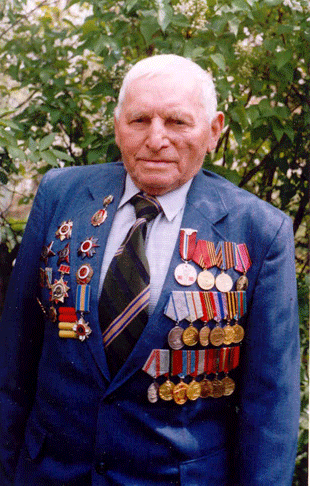
Konstantin Ponomarenko,
our guide to Anakoj-Eli. In Tsvitochne we met this decorated
Soviet war hero of World War II, defender of Stalingrad,
wounded four times. Konstantin was born in Anakoj-Eli
in 1921, and lived there until 1936. His best friend was
a German, Joseph Fullman.
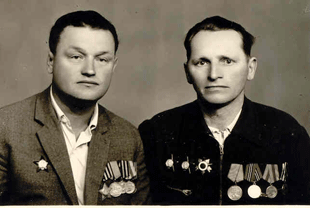
A younger Konstantin
(on the right) and his friend Nikolay.
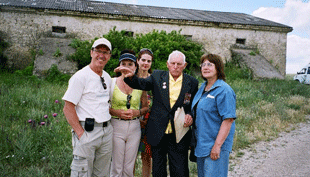
Konstantin talked
non-stop during our two-hour visit. There was so much
he wanted to tell us about the area. In his hand he is
holding an old map of Germany, printed in Russia in 1939.
Konstantin later gave this map to me as a present.
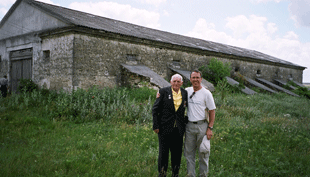
Standing with Konstantin
in front of a German-built storage facility for tobacco
and grain. This is a few kilometers south of Anakoj-Eli,
where a large private estate once existed. Before the
Revolution, this estate was owned by a wealthy family
named "Dyck".
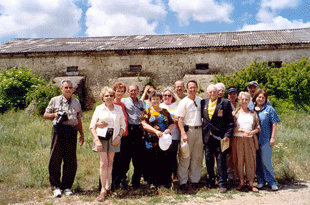
The Robert
Schneider Tour group in June, 2005. Crimea.
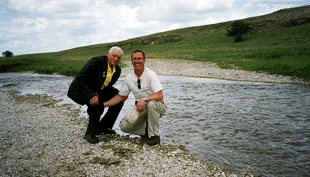
Konstantin and Merv
and the Burul’cha River, which we had to cross to
get to Anakoj-Eli.
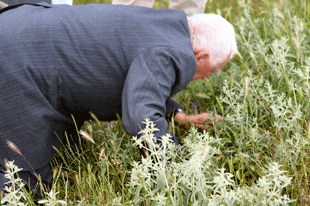
When we got there,
Konstantin was the first one out of the van. He fell to
his knees and kissed the ground, crying the whole time.
I was amazed at the man’s passion for his birthplace,
for his homeland, and for people in general. He told me
that I was the only other person that he knew on earth
that had a connection to Anakoj-Eli. (photo courtesy of
Jim Messer.)
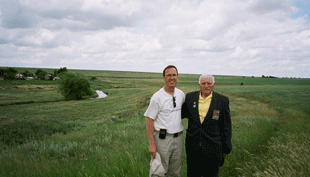
Standing on the site
of Anakoj-Eli. The photo was taken looking to the north.
You can see a bend of the Burul'cha River.
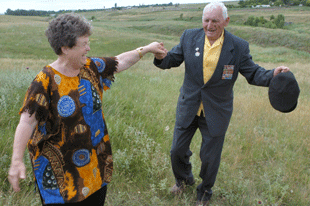
Energy to spare during
a road-side lunch break. Konstantin said he had a fondness
for beautiful women. This one is from South Dakota. (photo
courtesy of Jim Messer.)
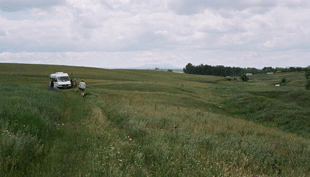
Looking towards the
south from Anakoj-Eli. I took this photo to show the beginnings
of the Yalta Coast mountains in the distance, which my
grandfather would have looked at every day. Yalta is about
72 km in a straight-line from Anakoj-Eli.
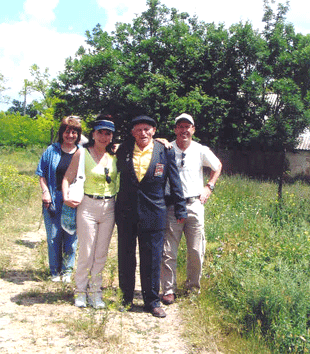
Standing on the street
in front of Konstantin's home in Tsvitochne.
(photo of Merv with
Konstantin's map)
FINDING ROOTS
IN CRIMEA
Meeting Konstantin
In May, 2005, I visited
Crimea with Robert Schneider LLC Tours. One of my objectives
was to visit the site of my mother's birthplace -Anakoj-Eli,
a small village which no longer exists. I had previously
found few references to the name of this village as it
appears on my mother's Russian birth certificate, and
I had found no one who could tell me where it was located.
All I knew was that my mother's family left Crimea in
December, 1924. But Valya Fromm of Mykolaiv, (who works
with Robert Schneider), in cooperation with Simferopol
Archives, found the geographical coordinates for the former
village of Anakoj-Eli. Valya began phoning to the offices
of nearby villages to locate someone who might remember
Anakoj-Eli. And that is how I came to meet Konstantin
Ponomarenko, who lives today in Tsvitochne, about 35 kilometres
east and north of Simferopol.
Konstantin too, was
born in Anakoj-Eli, in 1921, and lived there until he
began his studies at a technical school in 1936. The village
was a mixture of Germans, Russians, and Tatars. He said
the Germans were known to be intelligent and hard-working.
His best friend in the village was a German, Joseph Fullman
[Vollman], who also served in the Soviet army, but Konstantin
never heard what happened to him. Konstantin is a much
deocorated Soviet war hero, defender of Stalingrad, wounded
four times. He was so excited to meet me, his family said,
that he did not eat or sleep for three days prior to our
arrival. Very agile, mentally and physically, Konstantin
jumped on our bus and gave the driver directions. First
he wanted to show us the abandoned collective farm, where
he and his wife had worked for many years. It was formerly
the property of a wealthy German family named "Dick".
He pointed out the ruins of many buildings and what they
were used for. The estate had a large cattle and livestock
operation, had many grain storage buildings, had beautiful
orchards, ran a very large bee and honey operation, and
had several hot-houses, one of which was built as the
second storey of the honey warehouse. There was a large
tobacco factory nearby, and I remembered our family history
which said one of Grandmother's brothers was a tobacco-cutter.
I also remembered being told that after he returned from
service in the Tsar's army during World War I, Grandfather
Schafer worked on a large farm. This was likely the one.
Konstantin had brought
along a present for me. It was a large folded wall map,
paper bonded onto canvas, of Germany, printed in the Russian
language in 1939. It was the map he used to find his way
around Germany during World War II. In return, I asked
Konstantin if there was anything I could do for him. I
was expecting perhaps he could use some cash for medicines
or something to fix his house. Instead, he told me about
a book he had written of his experiences during the war
years. He very much wanted to get it typed and printed
so that he could give copies to his family and friends,
including some comrades who were still alive. The book
is based on the daily diary which he kept during the war,
and which he had with him to show us. The book contains
many poems he had written during those years. When I agreed
to help, he took us to his home, and produced four school-type
notebooks, beautifully hand-written. Inna read a few pages
and said the grammar and sentence structure were perfect.
The book turned out to be just over 400 typed pages. He
now has the entire book, poems and cover photograph, in
hard-copy and on a CD. The original "manuscript" has also
been returned to him. It was my pleasure to help him,
small recompense for the pleasure I received from spending
a mere two or three hours with this intelligent, articulate
and emotional man, who was so excited to meet us and tell
us about his life. He recited his poetry from memory,
and he danced with Millie Halsey (another tour member)
because he liked beautiful women! I can only wish for
that much energy when I am 84 years old.
Shortly after I returned
home on June 10, I wrote Konstantin to thank him for his
present, and for guiding our tour group to Anakoj-Eli.
I included several pictures taken during our visit with
him, and also some photos of my family. He immediately
answered by way of the following letter. The letter was
translated from Russian to English by Inna Stryukova of
Mykolaiv.
Konstantin's
first letter - 28 June 2005
My dear village compatriot,
I am sending you
warm regards from sunny Crimea. All these days I live
with the impressions our meeting made on me. My children,
grandchildren and friends also send their greetings to
you.
I will tell you a
little about myself. My parents had four children. Their
daughter, Olympiade was born in 1914. She was 82 years
old when she died; she was single and did not have any
children. My elder brother, Sasha, born 1917, was killed
in the war in 1941. [There is also a younger brother,
Victor, who lives in Yalta]. I was born in 1921; I finished
secondary school and the communication technical school.
Before the war I worked as a head of the post-office.
In 1940 I was drafted into the army. I am a war veteran;
I was wounded four times. God saved me; I remained alive.
I got married after I returned home from the front. My
wife's name was Zoya; we had three children. Our elder
daughter, Natusha, has a daughter who is a dentist; she
is single; and a son who is a driver. He is married and
has a child. My son Sasha was born in 1950; he is married
and has two daughters, 24 and 17. My younger daughter,
Lucy (1950) has two sons, who are not married yet. The
oldest works in Kiev, as an engineer, and the other studies
at the university. He is 22 years old. You have met my
grand-daughter who has a baby. She has been married for
a year. Her name is Olga; she is a teacher. Her husband,
Kostya, is a policeman - a captain.
Until 1981 my wife
and I worked on the collective farm and then retired.
She worked as a shop assistant and later as a cook in
the kindergarten. I worked as an agronomist in the orchard;
I planted fruit trees in the orchards. For many years,
I was in charge of the refrigeration storage facilities.
My pension was 70 roubles. At that time it was equal to
$100 USD. I worked until 1997. Unexpectedly my wife fell
ill and I had to quit my job. Our younger daughter, Lucy
and her family moved to my house, and now we live together
very friendly and peacefully. My wife Zoya was ill for
4 years before she died. Lucy works as an accountant;
her husband Anatoly is an agronomist. We are not rich
but we are very happy. When I worked I went to work by
bicycle or by motorcycle. Two years ago we bought a second-hand
car, a Ford, and my son-in-law drives to his work with
it. His salary is $70 USD per month, and Lucy's is $56
USD.
When I was younger,
I often visited my comrades-in-arms in different cities
which we once liberated. About ten times I had a rest
in the Sanatoriums. My wife Zoya, only once, traveled
to Novorosiysk and spent three days there. We were busy
in our backyard; we had a cow and a calf, a couple of
pigs, and some poultry. So my life was always in motion
and went its usual way.
Recently we have
marked the 60th anniversary of Victory in WWII. Not many
people have lived up to that day; many of my comrades-in-arms
have already passed away. My dream is to have peace in
all the world. I was on the Elbe River; we met the Americans
there; they were good guys. I was in Germany, Czechoslovakia,
Poland and Hungary. All the people were very nice, very
kind-hearted; we shared everything with them. In Austria
I lived in a lady's home; she was very poor. She had just
a cup of tea and a little salad in the morning. I brought
her the food from my rations. Suddenly her son came back
from the front. We both were in Stalingrad at the battle
at the same time and we fought against each other. We
met at his home, and there we were, sitting at the table
and drinking tea together. We talked about that terrible
war which nobody needed, about our killed comrades, and
we cried and laughed and were happy just to be alive.
In 1947 the division
I was serving in came to Crimea. My General tried to talk
me into staying in the army, but I did not agree as I
had my old parents at home. I came home and found out
that they had nothing to eat, not even a piece of bread.
They ate grass; they got only 200 grams of flour per day
to cook boltushka. ["boltushka" is flour stirred in water
and cooked.] This, at the same time, when Berlin was conquered,
Stalin sent there one hundred thousand TONS of meat and
200 thousand tons of flour.
It is good that your
grandparents left in 1928 [actually1924]. In 1933 there
was a famine in Crimea, Russia and Ukraine because the
crops were bad. Many people died of starvation. Everything
passed and before 1991 our country was well-to-do and
strong. Now the collective farms do not function anymore,
and people have to survive as they can.[1]
That is all, my friend.
Give my greetings to your wife, to your daughters, friends
and all who came from Russia. Let them read this letter
to you, and ask them to answer me in Russian.
Sincerely yours,
Konstantin. 28 June 2005
[1] Konstantin's
frustrations with current economic conditions in Ukraine
are revealed in this segment of his second letter to me,
dated 16 August, 2005.
From Konstantin's
second letter.
When I was born [1921]
there was a terrible famine in Russia and Ukraine. My
mother told me that America had helped Russia, Ukraine
and Crimea. We are so grateful for that aid. We remember
it and tell every new generation about it. There was another
famine in 1933. Many people died including innocent children.
After the war, in 1946-1947, food was very scarce in our
country. I came back home from the Front and found out
my family had no bread. This is how all people suffer
from war.
We came back from
the Front and began to build up the economy destroyed
by the war. We were happy. Our lives were improving every
year. But our government made a big mistake by launching
thousands of missiles to develop our military potential.
Praise the Lord the third world war did not happen. All
that expensive military equipment would be of better use
by turning it into scrap metal to build ploughs and combines.
In 1991 another stupid
thing was done, a strange and unnecessary Perestroika.
Before perestroika, everything was well organized. We
had good yields of crops. Industries were productive.
Food and education were free. And then suddenly, within
five to ten years, all good things achieved with such
difficulty were ruined, upset and stolen. Millions of
un-employed appeared in the country. It was all so stupid.
And nobody is responsible for anything. It was decided
to give the land to the people. But the farmers do not
have the equipment to work, and they do not have the money
to buy it. People lost their savings in the banks due
to the devaluation of our currency. Few people want to
work on the farms. The young people tend to move to the
cities. The collective and state farms have been destroyed.
It is not profitable to raise cattle, grow vegetables
and fruit. The salaries are low and people have to go
abroad to earn money. Who will grow the crops? The prices
for fuel and for machines have practically killed farming.
That is the result brought to us by perestroika and the
market economy which we cannot understand. Ten percent
of the population got rich, and the rest became poor and
un-employed.
My comments
on Konstantin's letters
Konstantin’s
comments on the 1933 famine reflect the official Soviet
explanation of those years. It conveniently ignores Stalin’s
purposeful plan to starve the Ukrainians into submission,
and the Germans who happened to live in Ukraine at the
same time were caught in this scheme. Yes the harvest
was bad that year, but the colonists had had all their
grains requisitioned already in 1931, so that it was punishable
by death to possess even a kernel of grain or corn outside
of the collective farms. The people even “re-cycled”
horse and cow manure to glean the few kernels of corn
or wheat. The Soviets had taken almost all of the horses
from the colonists, so that there were no horses with
which to operate the farm implements. Many men had already
been shot or taken to prison camps because they refused
to turn over their possessions to the collective farms.
Many families were without adult males, fathers or sons.
No wonder the harvest was bad!
Konstantin sent me two photos of him and his family in
front of war memorials on the fiftieth and sixtieth anniversaries
of the end of World War Two. His comments on the photos,
and the fact that he chose these photos to send to me,
reflect the life-long impact the war years had on him
personally, and the importance he associated with victory
and the war's end. Konstantin's comments about all the
food being sent from the Soviet Union to Germany after
the war are interesting. I would like to have this substantiated
by another source. But I do not question his sincere love
and support for his homeland. He is a wonderful man with
a zest for life. It was a pleasure to meet another person
who was born in Anakoj-Eli. He was truly thrilled to meet
me. At one point he looked at me and said, "You are the
only other person in the world that I know of that has
a connection to Anakoj-Eli." How could I not be moved
by such a man or by such a comment? We stood in the Burul'cha
River together and it was an unforgettable moment. Before
we parted, Konstantin kissed the hand of every lady, and
he shook each man's hand.
Konstantin was, and still is, a member of the Communist
Party, and did not vote for the new president, Victor
Kushenko. Konstantin feels that Ukraine has gone backwards
since it is no longer a part of the Soviet Union. Economically
speaking, he is indeed correct. When Ukraine gained its
independence from USSR in 1991, it had to start building
its own government and bureaucratic infrastructure from
the ground up. It lost all the central direction which
Moscow had previously provided. Ukraine has had to learn
the “business of government” from scratch.
It is like a child leaving home, not because he or she
is ready to meet the world, but because the child wants
the freedom to make its own decisions, and the right to
shape its own future. And certainly, Ukraine is now enjoying
a freedom that was previously denied to its citizens,
but it has come with the cost of a deteriorated standard
of living. And no one feels this more than the old people,
like Konstantin, who just wish things could go back to
the way they were before 1991. Certainly as a farmer,
Konstantin is ashamed and frustrated that the once-productive
Soviet collective farms now lay in abandoned ruins. And
he cannot yet envision that individual farmers one day
will be as productive as the old collectives were. It
is a confusing world right now for the citizens of Ukraine.
(Merv Weiss, 16 Nov
2005)
After his second
letter, Konstantin wrote six hand-written pages of his
historical remembrances of Anakoj-Eli. After Inna's translation,
I did some editing for easier reading.
HISTORY OF
ANAKOJ-ELI
-- as remembered
by Konstantin Ponomarenko
-- story and letters
translated by Inna Stryukova
-- editing by Merv
Weiss, November 06, 2005.
The lovely Burulcha
River begins in the mountains of southern Crimea. In winter
it is small and does not have much water. But when spring
comes and the snow begins to melt in the mountains, the
river gets bigger and its water flows all over the valley.
In this beautiful valley there were many small villages
which had been part of Karasu-Bazar or Kai-Ma Khan's estate.
The villages had names which were given to them by the
Tatars. Burulcha district consisted of 25 villages, including
Anakoj-Eli, Tuku-Eli, Sarachel, Staraya Burulcha, Novaya
Burulcha, and the village of Baraskhan in between them,
Karlovka, Arganchuk, and others. Along with other villages
in the valley, there were also the villages where mainly
the German population lived. They were Terekli-Shikel,
Kerklech, Rosental, Neusatz, and others.
After Crimea had
been joined to the Russian Empire in 1783 the tsarist
government started populating the peninsula. Part of the
Tatar population emigrated to Turkey. During this time,
both Russian and Ukrainian families moved into these Crimean
villages. At the beginning of the 19th century, foreigners
were allowed to settle in Crimea, under very advantageous
conditions. Thus, Germans, Greeks, Bulgarians, Armenians,
and others appeared in Crimea. Among the villagers in
Anakoj-Eli there were two Tatar families, the Estonian
family, the Gypsy family, Russians and Germans. Everyone
got along well. Those who were richer helped families
with many children, and also widows of soldiers who had
been killed during World War I.
The land in our valley,
thirty thousand hectares, was owned by landlord Rusov,
who lived in Odessa. Later all the land belonged to landlord
Dick. The manager was a Schmidt. In 1924, according the
Decree on Land, the land was confiscated from landlord
Dick and given to the peasants. He fled to France. The
four-year Civil War, which began really in 1914, was over
in Crimea in 1920. There were many foreign war prisoners
in Crimea at that time.
Staraya Burulcha
was the capital village because it was the landlord's
estate. His three two-storeyed houses were situated there,
one for the landlord, and two for his workers. There were
also other dwelling houses, grain-storage buildings, a
stable, a blacksmith shop, a carpentry shop, a canteen
and dining area, and barns for livestock. The stockyards
were surrounded by high fences.
Anakoj-Eli was situated
on the hills on the right bank of the Burulcha River.
There were about 25 houses there, the design of which
was rather primitive. They were built of stone and "kalyb".
Kalyb was a mixture of clay and finely cut straw. They
kneaded it with the help of horses, or by feet. Then they
put it into moulds and left it to dry. All the new settlers
built this way. The houses in Anakoj-Eli were covered
with the soil and ash on top. The floors were also covered
with soil. In the middle of the house there was a stove.
People used straw and sunflower stalks for fuel. In summer,
those people who had livestock made small blocks of manure
and dried them on the stone fences, on the barns and other
farm buildings. I do not know why, but people did not
cut wood [for fuel].
The citizens of Anakoj-Eli
were mainly farmers. They had vegetable gardens which
they watered bringing the water from the creek. There
was a meadow which provided them with grass and hay. They
divided it between the farmers. There was also the "fund"
land which was given to the people who lived near the
forest. The farmers of the village grew grains, vegetables
and orchard crops. The Germans grew much corn. The main
food was the corn flour which they mixed with wheat and
baked the so-called cornbread.
The holidays, weddings,
birthdays, and baptisms were celebrated together. The
Orthodox believers visited the Russian Church. The Tatars
went to the Mosque. There were also Prayer Houses. The
weddings were big events because the villages were small
at that time and all the villagers were invited. Before
the Revolution of 1917 there were only church weddings.
The nationality was not important. In Anakoj-Eli, there
was a family where Yuri was Russian, and his wife, Philomena,
was German.
The main holidays
were the New Year, Christmas, Easter and Baptisms. A very
important holiday was Pokrov [2]. Everybody was looking
forward to this holiday. All the workers were hired until
Pokrov, on the eve of which, the masters had to pay the
workers, who then left for their homes. Only the native
villagers remained. The wages were very low, but the money
seemed to be enough.
Before the Revolution,
the farmers used horses and oxen to plough the land. The
first tractor, as far as I remember, appeared in Anakoj-Eli
about 1927. It was given to the village for a short time,
but then it was taken away. I do not remember why or where
it went. The formation of the collective farms started
in 1927. Many of the Germans had already left, some to
Germany, others to Canada and America. The productivity
of the collective farms was low in the first years of
the collectivization. Since the 1930’s the so-called
machine and tractor stations were formed. They worked
for the collectives and the state farms. Soon the collective
and state farms began to own their own sowing and threshing
machines and later the tractors. Before World War II,
the collective in Staraya Burulcha had three cars. The
life of the farmers was getting better but the peaceful
development was interrupted by the war with Finland first
and then with Germany. The World War II lasted for four
long years and brought hardships and sufferings to all
the nations in Europe.
My parents came to
Crimea on foot and lived there all their lives. They could
not go back to Ukraine because their parents died early.
They were 14 years old when they came at the end of the
19th century. I would like to say that the German nation
was, is and will be noted for being very hard-working,
educated, and I would say, very cultured.
[2] Pokrov is the
Feast of the Protection of the Holy Virgin. It marks the
end of the harvest/fall and beginning of winter. At this
point, the harvest is essentially over and the last fruits
to ripen, the pumpkins, are picked on this day. In agrarian
times, this holiday honored Mokosh, the goddess of the
earth, who had provided her fruits, so that the people
could survive. Pokrov means protection or intercession.
I invite correspondence
from anyone with information on these Crimean families
– Schafer, Hörner, Tichy – from these
areas – Rosental, Neusatz, Tasanai, Hochheim, and
of course, Anakoj-Eli. Please contact me through my website
at www.russianroots.ca.
Merv Weiss, Saskatoon,
SK
|

